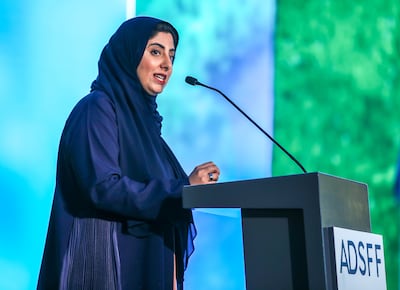The UAE’s Securities and Commodities Authority is in talks with the Ministry of Climate Change and Environment and other stakeholders to develop a carbon-trading mechanism as the Arab world’s second-largest economy aims to achieve net zero in the coming three decades.
“Due to the large footprint of the carbon sector in the country, it would be useful to have a carbon-trading mechanism in the UAE,” SCA chief executive Maryam Al Suwaidi told the Abu Dhabi Sustainable Finance Forum on Thursday.
“The SCA is consulting the Ministry of Climate Change and Environment and other stakeholders on ways to implement this.”
Carbon credits, also known as carbon offsets, are permits that allow companies to emit a certain amount of carbon dioxide or other greenhouse gases.
The market for the financial instrument could be worth more than $50 billion by 2030, according to consultancy McKinsey.
Last year, the Abu Dhabi Global Market teamed up with AirCarbon Exchange to create the “world’s first fully regulated” carbon-trading exchange and clearing house in the emirate.
The ADGM will regulate carbon credits and offsets as emission instruments, and issue licences for exchanges to operate both spot and derivative markets.
“The ultimate goal of the SCA’s road map is to create a gradual and lasting change in the culture and mindset of all regulated entities in relation to their role and responsibilities towards achieving sustainability,” Ms Al Suwaidi said.
“The SCA will continue to encourage all efforts to support [the] national agenda towards the UAE's Net Zero by 2050 strategic initiative.”
Speaking at the same forum, Sheikha Shamma bint Sultan, president and chief executive of the UAE Independent Climate Change Accelerators, said there was a "$3 trillion to $3.5 trillion” gap in annual investment made towards the UN's sustainable development goals and the climate.
“The solution lies in a new approach to funding known as blended finance,” said Sheikha Shamma.
“By merging private capital with development funding, blended finance structures allow people to de-risk their investments, while still investing with a purpose.”

In 2021, blended finance represented an aggregated financing of more than $160 billion, according to Convergence, a global network for blended finance.
The Emirates is investing Dh600 billion ($163.37 billion) in clean and renewable energy projects over the next three decades as it aims to achieve net-zero emissions by 2050.
The country has also urged public and private companies to adopt carbon neutral measures.
In January last year, the ADGM announced that it had achieved carbon neutrality by offsetting its emissions in 2021, becoming the world’s first international financial centre to do so.

